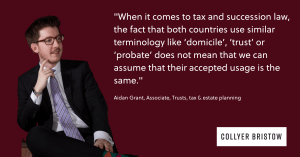- International trusts, tax and estate planning
- Charity and philanthropy
- Private Wealth
- Tax & Estate Planning
- UK trusts, tax and estate planning

Shorter Reads
How should I approach charitable giving?
There are various ways to give to charity, and which is most appropriate will vary depending on the circumstances. Aidan Grant outlines the various options available.
1 minute read
Published 4 October 2021
Key information
Charitable giving should always be encouraged. However, there are various ways to give to charity, and which is most appropriate will vary depending on the circumstances.
Simple donations
For small cash donations, particularly those to existing UK registered charities, simplicity is often best. Tax relief is given on donations and there is usually very low administration involved for the donor. However, although a donor can place some limits on how the donation should be applied, the simplicity of the process also means giving up long-lasting control.
Setting up a charitable foundation
For large donations, or where the donor wishes to retain control over the expenditure of the funds, or if the donor wants to obtain the immediate tax relief on the donation but is not yet ready for the funds to be dissipated, then the creation of a new charity may be preferable.
The donor can be one of the trustees, and the charity could be anything from a simple grant making charity up to a fully operational charity. However, the donor should be aware of the ongoing reporting requirements for charities (and particularly charitable companies). Additionally, once the donation has been made the funds have effectively become public money; the donor must accept that they cannot benefit from those funds after that point.
Donor advised funds (“DAFs“)
DAFs are an alternative to creating a new charity, allowing the donor to donate to the DAF which in turn dissipates the funds in accordance with the donor’s wishes. Using a DAF saves on much of the time, cost and effort of running a charity.
Foreign charities
Gifts to foreign charities should be handled with care. Importantly, many direct donations will often not attract tax relief for UK taxpayers. In part this can be because the organisation may have the status of a charity in its local jurisdiction, but it does not fit within one of the discrete heads set out in UK charity law.
DAFs prove a popular workaround to these issues; here the donor makes the donation to the UK DAF, claiming the appropriate UK tax relief, and the DAR then makes the onward donation to the foreign charity. Alternatively, some established foreign charities have a UK “friends of” subsidiary to which UK donations can be made. UK residents who are liable to tax in foreign jurisdictions (for example US citizens) should also check whether donations to UK charities qualify for tax relief in that other jurisdiction.
Related content
Shorter Reads
How should I approach charitable giving?
There are various ways to give to charity, and which is most appropriate will vary depending on the circumstances. Aidan Grant outlines the various options available.
Published 4 October 2021
Associated sectors / services
Authors
Charitable giving should always be encouraged. However, there are various ways to give to charity, and which is most appropriate will vary depending on the circumstances.
Simple donations
For small cash donations, particularly those to existing UK registered charities, simplicity is often best. Tax relief is given on donations and there is usually very low administration involved for the donor. However, although a donor can place some limits on how the donation should be applied, the simplicity of the process also means giving up long-lasting control.
Setting up a charitable foundation
For large donations, or where the donor wishes to retain control over the expenditure of the funds, or if the donor wants to obtain the immediate tax relief on the donation but is not yet ready for the funds to be dissipated, then the creation of a new charity may be preferable.
The donor can be one of the trustees, and the charity could be anything from a simple grant making charity up to a fully operational charity. However, the donor should be aware of the ongoing reporting requirements for charities (and particularly charitable companies). Additionally, once the donation has been made the funds have effectively become public money; the donor must accept that they cannot benefit from those funds after that point.
Donor advised funds (“DAFs“)
DAFs are an alternative to creating a new charity, allowing the donor to donate to the DAF which in turn dissipates the funds in accordance with the donor’s wishes. Using a DAF saves on much of the time, cost and effort of running a charity.
Foreign charities
Gifts to foreign charities should be handled with care. Importantly, many direct donations will often not attract tax relief for UK taxpayers. In part this can be because the organisation may have the status of a charity in its local jurisdiction, but it does not fit within one of the discrete heads set out in UK charity law.
DAFs prove a popular workaround to these issues; here the donor makes the donation to the UK DAF, claiming the appropriate UK tax relief, and the DAR then makes the onward donation to the foreign charity. Alternatively, some established foreign charities have a UK “friends of” subsidiary to which UK donations can be made. UK residents who are liable to tax in foreign jurisdictions (for example US citizens) should also check whether donations to UK charities qualify for tax relief in that other jurisdiction.
Associated sectors / services
- International trusts, tax and estate planning
- Charity and philanthropy
- Private Wealth
- Tax & Estate Planning
- UK trusts, tax and estate planning
Authors
Need some more information? Make an enquiry below.
Subscribe
Please add your details and your areas of interest below
Article contributor
Aidan
GrantPartner
Specialising in International trusts, tax & estate planning, Private wealth, UK trusts, tax & estate planning and US/UK Tax & estate planning
Enjoy reading our articles? why not subscribe to notifications so you’ll never miss one?
Subscribe to our articlesMessage us on WhatsApp (calling not available)
Please note that Collyer Bristow provides this service during office hours for general information and enquiries only and that no legal or other professional advice will be provided over the WhatsApp platform. Please also note that if you choose to use this platform your personal data is likely to be processed outside the UK and EEA, including in the US. Appropriate legal or other professional opinion should be taken before taking or omitting to take any action in respect of any specific problem. Collyer Bristow LLP accepts no liability for any loss or damage which may arise from reliance on information provided. All information will be deleted immediately upon completion of a conversation.
Close






























































